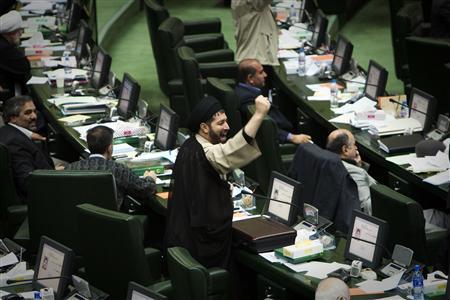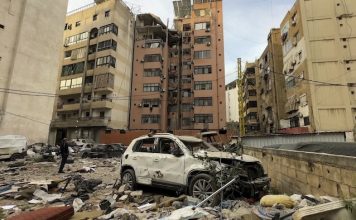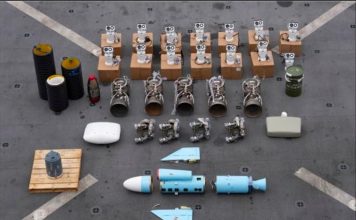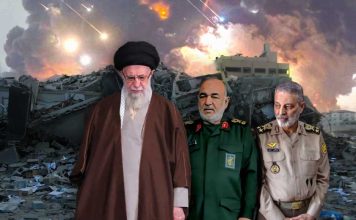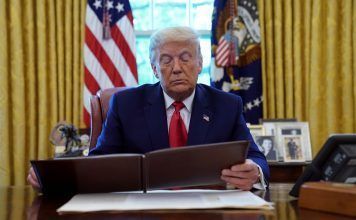By Kayhan Life Staff
The Iranian government’s economic team and the Majlis (Iranian Parliament) have been engaged in a dispute that has escalated in recent days.
Majlis deputies reviewing the government’s budget bill have been concerned about this year’s budget deficit.
The government has deflected criticism and blamed others for the problem.
According to some Majlis deputies, the government’s budget is posting a deficit of $9.75 billion (based on an exchange rate of 41,000 tomans to one U.S. dollar).The deficit could pose serious economic consequences in the closing months of this calendar year (the new Iranian year starts on March 21), and could significantly impact the government’s 2023-24 budget bill.
There are various signs that the government has run out of money, including its failure to raise the salaries of government employees, to implement the National Housing Movement project (building 4 million homes in four years), and to roll out the Digital Coupons plan (allowing people to access a limited amount of bread at subsidized prices) – measures aimed at offsetting the elimination of the special exchange rate (4,200 tomans to a U.S. dollar).
Iranian President Ebrahim Raisi submitted his government’s 2022-23 budget bill to the Majlis in December 2021. His cabinet projected a $221.5 billion budget based on estimates of 8 percent economic growth.
Iran’s Government Swells Budget to Boost Growth, Cut Inflation
However, several economists argued that the budget bill was “unrealistic” and would worsen the economic crisis in the country. The cabinet’s proposed budget bill projected $221.5 billion in revenue, but also $332 billion in spending, which will result in a massive budget deficit.
In comments reported by the Tehran-based Aftabe Yazd online newspaper on Jan. 7, Mohammad Reza Pour-Ebrahimi, the chair of the Majlis’ Economic Commission, said: “We expect the government to take effective measures to prevent a $9.75 billion budget deficit.”
According to Mr. Pour-Ebrahimi, in addition to a $9.75 billion budget deficit, the government also owes Iranian banks $13.9 billion.
Iran Is Experiencing Large-Scale Capital Flight, Expert Says
Pour-Ebrahimi said “the budget deficit and the country’s banking system” were the leading cause of inflation in the Iranian economy, adding that Iranian banks owed $8.7 billion to the Islamic Republic of Iran Central Bank.
“These debts play a crucial role in increasing liquidity and inflation,” Pour-Ebrahimi explained. “The country’s foreign exchange policy has destabilized the economy. The average inflation rate for the past four years in Iran has been around 35 percent, which, if continued, will create an extraordinary situation.”
“The rate of liquidity raises on average by 32 percent every year, which is detrimental to the Iranian economy,” Pour-Ebrahimi warned.
Comments by other Majlis deputies show that the government still needs to generate revenue through the sources it had listed in its budget bill.
In an interview with the Tehran-based Tasnim news agency on Jan. 9, Abdolali Rahimi-Mozaffari, who is on the board of Majlis’ Energy Commission, said: “There have been no discussions on increasing the price of energy sources (electricity, gas, oil, gasoline and diesel fuel) in the 2023-24 budget.”
“The plan for a fair distribution of energy per capita must happen within the revolutionary energy economics, which is a massive job,” Mr. Rahimi-Mozaffari argued. “We may succeed if we deliver energy equity on one energy source. However, it [the budget] includes other energy sources, which could be problematic.”
Some Majlis deputies have rushed to defend the government’s energy policy and Iran’s Minister of Economic Affairs and Finance, Ehsan Khandouzi.
Hamidreza Haji-Babaei, the chair of the Majlis’ Program, Budget, and Accounting Commission, said the current budget had no deficit and that “100 percent of the plans to generate revenue included in the budget have been realized.”
In comments reported by the government’s news website on Jan. 10, Minister Khandouzi dismissed reports of the government’s $9.75 billion budget deficit.
“This is an inaccurate estimate. We do not know the exact figure,” Mr. Khandouzi noted. “Besides the positive signs, we have faced some problems recently. The Central Bank and us will take decisive action to tackle volatility caused by the illegal currency and futures market.”
“Relevant ministries are managing the unstable market of necessary goods, which has been a major source of worry for many households,” Khandouzi added.
In comments reported by the Tehran-based Eco Iran news website, the head of Iran’s Plan and Budget Organization (PBO), Massoud Mir-Kazemi, said: “This is probably the first year that we are managing the smallest discrepancy between the budget projection and our achievements.”
Mr. Mir-Kazemi dismissed reports about the government’s $9.75 billion budget deficit, calling them “mere rumors,” and blaming the media for spreading “false information.”
“The Majlis’ Program, Budget, and Accounting Commission held a meeting with experts, reviewing the government’s sources of revenue and expenditures,” Mir-Kazemi said. “Some 900 projects were completed in nine months, matching the incurred expenses.”
“We expect by the end of the year, we will generate $31.7 billion in revenue,” he claimed. “We will meet our expenses and obligations according to our plan and will not have to take out more loans.”
“The commission believes that based on our performance in those nine months and a 12-month forecast, we will use the listed resources 100 percent,” Mir-Kazemi added.
Only two months earlier, Mir-Kazemi had warned about the government’s budget deficit.
In an open session of the Majlis on Nov. 8, Mir-Kazemi had said the government’s budget deficit stood at $4.8 billion, adding that the revenue to make up for the shortfall “could not fall from the sky.”
President Raisi’s economic team expected Iran’s oil export to rise to 1.4 million barrels per day (BPA). The government also predicted it would sell Iranian oil for $70 a barrel. However, Iran never generated the expected revenue even after the Russian invasion of Ukraine in February 2022, which caused the price of oil to rise.
In November, the government took further loans from the Central Bank and printed new banknotes with four zeros, a move towards making toman the country’s official currency. The measure increased liquidity and caused the inflation rate to rise.
Mr. Raisi’s 2023-24 budget bill predicts generating $20.1 billion and $14.7 billion in oil and tax revenue, respectively. Notably, his government has failed to generate oil revenue or collect the tax forecasted in the current budget.
The current year’s budget deficit will be added to the 2023-24 budget deficit, worsening the country’s economic crisis, and pushing more people into poverty.

